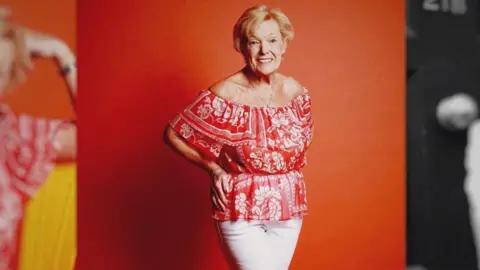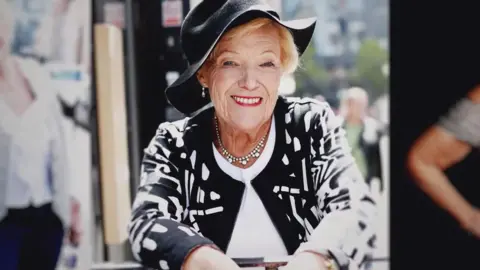I was fooled into paying £500 to be a model. Here’s how to avoid my mistake
4 hours agoYasmin RufoBBC News

 BBC
BBCWhen 79-year-old Judy Corker from Manchester saw a social media advert calling for older models, it sounded harmless enough and the idea of getting glammed up and maybe earning a bit of money on the side was appealing.
“It said there was a lack of mature models, so I thought I’d fill in the form for fun,” she tells BBC’s Morning Live.
But what Judy didn’t realise was that she’d stepped into the latest version of a long-running scam.
For years, phoney modelling agencies have been taking cash from young people desperate for a leg up into the industry, charging hundreds for fake portfolios and jobs that never materialise.
With the fashion industry promoting more diverse looks and embracing older models, scammers have found a new target: older people like Judy.


After filling in the online form, Judy was invited to a photoshoot in Manchester and was asked to pay £200 for five professional images that would supposedly be shared with modelling agencies.
Soon after, an agency called her to discuss a possible job with a cruise company and Judy thought the investment was paying off.
“I said I’ve done a lot of cruises with my husband before he died and they said I would be perfect,” Judy says.
She was told to secure the job she needed to visit a studio in London for another photoshoot.
“I felt quite good walking through the street all glammed up,” she admits. “I really did quite enjoy it.”
At the photoshoot Judy paid £300 for ten images and was later told her pictures had landed her the cruise job and she would be paid £1,100.
“They sent me a contract and it all looked legal so I signed it and I was thrilled to bits.”


Also thrilled to have a modelling job was 73-year-old Roland Parker who was offered the same job as Judy with the same client and studio, just three weeks apart.
“I’m not well off and I thought this job could help me earn a bit of money and make life more comfortable,” he says.
He paid £200 as a refundable attendance fee, then more for other supposed jobs.
When he arrived at a Manchester studio for one of the shoots, the staff said “they knew nothing about this”.
By the time he realised he’d been scammed, he’d lost around £1,000 in fees and travel expenses – money he’d sent using PayPal’s “friends and family” option, which meant he had no buyer protection.
Scammers will often ask for purchases to be made through the “friends and family” option, which has no fee attached to it.
But it’s important to pay for all goods and services through PayPal’s “goods and services” option as that ensures you are protected if you are scammed and PayPal will refund eligible transactions.
Judy eventually tracked down the genuine owner of the Manchester studio who told her he was “getting people turning up here expecting a shoot with a cruise line but it’s a scam on a big scale.”
She also paid her attendance fee via PayPal but used the goods and services option which meant she was refunded. She also reported the company to Action Fraud.
Don’t pay money upfront
Mike Andrews from National Trading Standards, says this new twist on a well-known scam is designed to “fleece victims out of as much money as possible”.
“The scammers are not content with taking a few hundred pounds for fake photoshoots anymore,” he explains. “They go back repeatedly with the promise of a lucrative contract.
To protect yourself from scams, make sure you:
- Never pay upfront. Andrew says no reputable business or agency would ask consumers to pay money upfront on the promise of lucrative work
- Check who you’re dealing with. Look up the company on Companies House, search for independent reviews and confirm their contact details match those on official sites
- Use secure payment methods. Always use buyer-protected platforms and avoid bank transfers or “friends and family” payments, which can’t be refunded
- Beware of pressure. Scammers often create a sense of urgency to make you act quickly whereas a real agency will never rush you to pay
- Ask someone you trust. Talk to friends or family before committing to anything as a fresh pair of eyes can spot warning signs
- Report it. If you’ve been targeted, contact Action Fraud or Trading Standards as your report could help protect others

